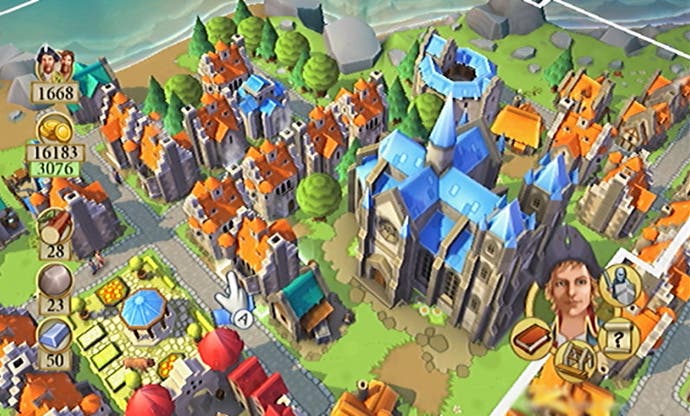Anno: Create A New World
Prosperous.
It's always a little worrying when you see developers and marketers working at crossed purposes. On the back of the box, at the top of the series of captioned pictures describing Anno: Create A New World's prime features, it says, "Team up with a friend and explore together".
Which sounds very nice, and very Wii-co-operative-social-play-stuff, but as far as I can see, it isn't mentioned in the manual. It doesn't appear to be mentioned at any point in the game, either. After playing my way through the story mode, I figured I'd just plug in a second controller and see what happened. Up comes a second pointer, which doesn't seem to be able to do anything functional in the game. You can send fireworks and put decorative things on the floor - which the other player can get rid of without even reaching for the delete tool - but nowt else.
While it doesn't actually contradict the back of the box, and the fireworks are pretty, it's only little more interaction than getting your friend to crouch beside your television and point with their fleshy finger to anything at which they think you should be having a nose.
There are lots of these flashes of strangeness - bits where the strenuous effort of making this as slick a version of the venerable PC Anno games as possible goes slightly awry - but to the developer's credit, it generally succeeds. The Anno games are PC games so quintessentially PC - and German PC specifically - that even as staunch a PC follower as myself has never quite found the time to play them properly. A bit too scary. A bit too economic-y. A bit too much of a silly name. As such, a console version makes a lot sense, in an attempt to do to Anno what Civilization: Revolution did for Civ.
It's basically an island-colonisation game where you build and then manage a string of settlements. The core of the game is that you arrive on an island, and you set up some fishing villages, some houses and some foresters huts. Add to that a chapel and some milk, and the inhabitants of those houses will change from pioneers to settlers, which allow you to tax them. This continues, as you busy yourself adding other bits and pieces, until they turn into hyper-profitable aristocrats.

This also requires several islands, since the majority of the bits you need require the landmass in question to be fertile in that resource. You can only grow herbs in herb-fertile places, for example, and indeed there's a lot more along those lines: different levels of fertility, the ability to irrigate certain islands to make them fertile in a resource, having marketplaces to gather up resources and secondary sites to process raw materials into useful stuff (e.g. hemp into clothes). But that's the basics. You're creating an enormous tottering pyramid of production to satisfy your demanding citizens, who will then give you cash to spend on fizzy crisps and pop.
In other words, it's an economic game, cut back to the essentials and not too worried about its abstraction. You soon start playing the game rather than your own impressions of how something would work in the real world. For example, all that matters for production chains is the distance to the nearest stockpile. Actually having your, say, clay-production besides your potters is no quicker than having potters and clay-production on entirely separate islands, as long as a marketplace is in the vicinity to feed into a global stockpile. It's a very gamey way of doing things, and Anno's fine with that, as am I, because in other areas it's absolutely its strength.
Take exploration. Initially on a new story mission, the majority of the map is locked off, and you can unlock a single section for every achievement. This provides changing and localised goals to press towards, assuming you're looking for another island, and it also presses you into things it's easy to ignore, like treasure-hunting. You can purchase maps, which give you the location of a treasure chest. And you can always go to war with your rivals, which... oh, I'll deal with the war eventually.

